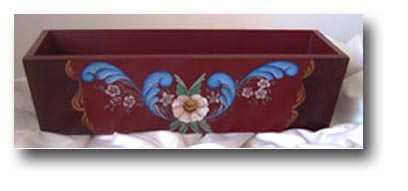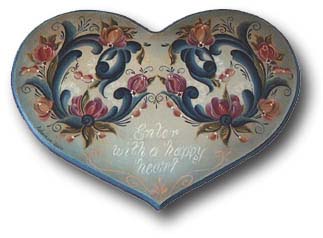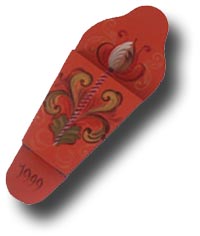Rosemaling Rosemaling is a decorative folk art originating
from Norway. As far back as the 1700’s, Norwegian artisans
decorated not just their household objects but walls and ceilings.
Rosemalers covered entire rooms in rosemaling. Sometimes religious
and wedding scenes were added in rather primitive style. It is
said that its roots lie in the elaborate carved scrolls found
on viking boats. "Rosemaling" literally translated
means "rose painting" and stylized roses, together
with the acanthus scroll were the most important elements of
this Norwegian folk art. 
A simple Rosemaling project suitable for
beginners.
A traditional Rosemaling design is characterised
by flowing lines and scrolls, imaginative, fanciful flowers,
and subtle, earthy colors.
Features of Rosemaling The basis of all rosemaling is strokework
at a skilful level and careful and confident blending. Flowing
'C' and 'S' strokes are used to make up the scrolls. The design
is usually enhanced with commas, teardrops and long delicate
lines tying the design together. 
This heart-shaped plaque was painted with
a symmetrical rosemaling design adapted from a design by Shirley
Peterich, CDA
Regional Variations of Rosemaling The Hallingdal Style is a characteristic
Baroque style with strong symmetrical designs and bold colours. Rosemaling in the Telemark Style on
the other hand is more infliuenced by the Rococo style - flowing,
asymmetrical and more intricate. Sometimes, telemark rosemalers
paint using a transparent technique which allows the wood to
show through. This technique is painted today using kleister
mediums or clear glaze mediums which create transparency when
added to acrylic paints. The Rogaland Style had an Oriental
flavour influenced probably by the tales of Norwegian seafarers
docking in at the coast. These features include the darker backgrounds
and delicate lattice work. Flowers painted in the Rogaland style
were, however, more realistic. 
A very simple
Rosmaling design painted in the regional style of Telemark
on a small scissors
holder.
|